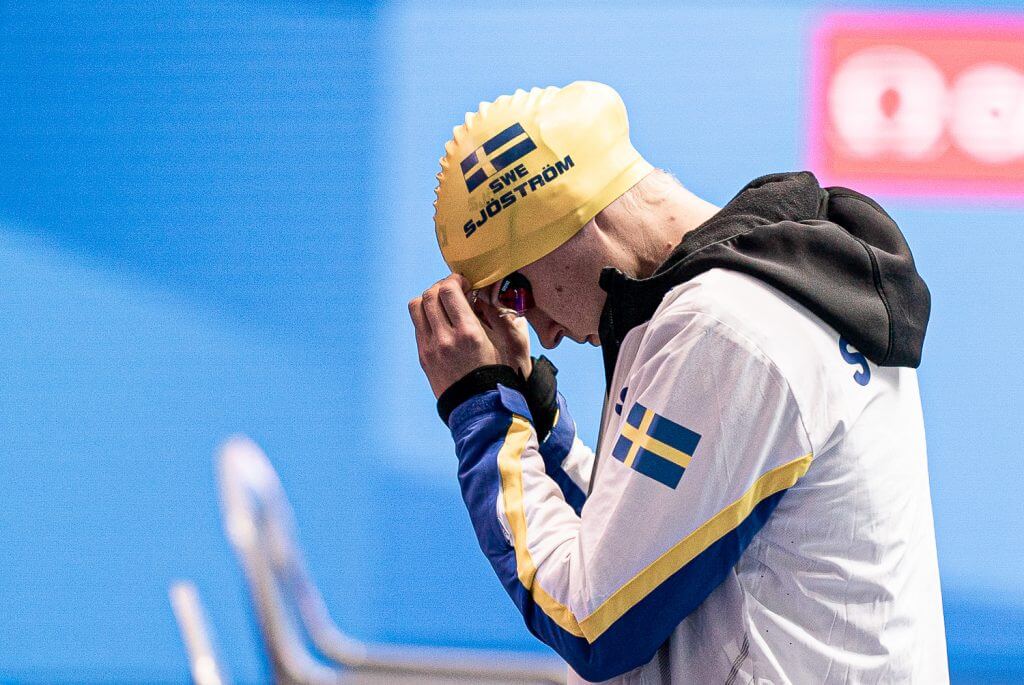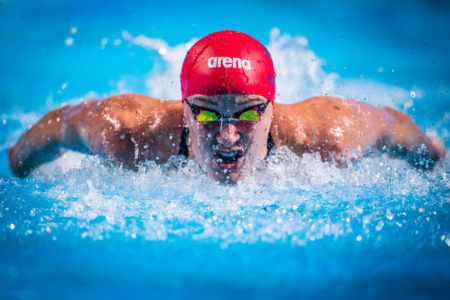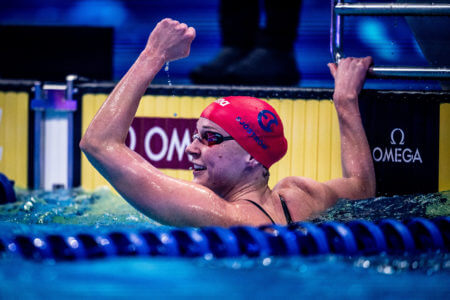After Injury Setback, How ‘Back’ is Sarah Sjostrom?

Editorial content for the 2021 Tokyo Olympic Games coverage is sponsored by GMX7.
See full event coverage. Follow GMX7 on Instagram at @GMX7training #gmx7

After Injury Setback, How ‘Back’ is Sarah Sjostrom?
For the first time in 2021, Sarah Sjostrom raced this week at the Mare Nostrum series in Canet, France. The results were nothing special, certainly not what we normally expect from the reigning Olympic champion in the 100 fly and the world record-holder in four long course events, but given the circumstances Sjostrom is dealing with, the results were particularly significant for determining just how ready the 27-year-old will be for her fourth Olympic campaign next month.
In early February, Sjostrom slipped on ice in Stockholm and fractured her right elbow, and she underwent surgery two days later. The projected recovery time from the surgery was three months, so her ability to compete at the Olympics was never in serious doubt, but her training in the leadup was undoubtedly going to be significantly hampered. Sjostrom told media outlets in Sweden that at one point, she had lost four centimeters of muscle mass on her right arm and that in her attempts at butterfly, she has had difficulty keeping her arms symmetrical. She said she is “doubtful” to race the 100 fly at the Olympics.

Sarah Sjostrom swimming butterfly during the 2020 ISL season — Photo Courtesy: Mine Kasapoglu/ISL
This week, Sjostrom competed in the 50 and 100 free, two events upon which she has increasingly focused on since she began training with coach Johan Wallberg in 2016 and two events in which she holds the world records. Sjostrom first posted a 24.68 in the 50 free prelims, after which she said she was pleased and had originally just hoped for a 25.0. In the final, she swam a 24.81 to finish third, more than seven tenths behind defending Olympic champion Pernille Blume of Denmark. A day later, Sjostrom again finished third in the 100 free in 54.84.
Comparing those times to the already-competitive world rankings, they do not stack up particularly well. Sjostrom is now 20th in the world in the 50 free and tied for 59th in the 100 free. She was more than a second off her world record in the 50 free and more than three seconds slower in the 100 free. Again, this is a swimmer coming off a major injury and a layoff, so it would have been absurd to expect she would be close to top form or even solid in-season form right now. But the Olympics are still on the horizon and fast approaching, and the Games won’t accommodate for injury.
Simply, whatever level Sjostrom can get to by late July, her performance there will not reflect her abilities. She will be better than whatever she shows in Tokyo. She may not defend her gold medal in the 100 fly, although it’s worth noting that Sjostrom has indicated before she would not race an event, only to jump back in at the last minute—specifically, the 200 free at the 2019 World Championships, where she won silver just months after publicly ruling out that race.
Still, Sjostrom remains a factor in the 50 and 100 free for Tokyo. She will compete at least once more before the Games, so she will want to see improvement from her times this week. At the 2019 World Championships, it took a 24.46 to qualify for the 50 free final (in a tie for 8th place) and 53.31 in the 100 free. Even after the COVID-19 pandemic, it’s probably fair to expect around those numbers for eighth place in Tokyo, and Sjostrom should be able to get to at least that range by late July.

Sarah Sjostrom celebrates a win during the 2020 ISL season –Photo Courtesy: Mine Kasapoglu / ISL
Winning a medal, however, will be much more challenging. In the 50 free, 2012 Olympic gold medalist Ranomi Kromowidjojo has already broken 24 this year, and Blume has been 24.05. Australians Cate Campbell and Emma McKeon, young American Claire Curzan and Poland’s Katarzyna Wasick have all been 24.1, and 2019 world champion Simone Manuel will also be in contention. It’s a similar story in the 100 free, where McKeon, Campbell and China’s Zhang Yufei all have been 52s this year and Manuel is likely to post a quick time at U.S. Olympic Trials in two weeks.
Essentially, there are a lot of really, really good swimmers in women’s sprint freestyle, and even though Sjostrom owns the world records in the 50 and 100 free, she would need to be in top form to contend for gold medals—and that’s a major ask, given the challenges she has faced this year. Still, Sjostrom is a champion, one of the best swimmers of this era, and as Campbell told Swimming World in February, if you want to count Sjostrom out, “do that at your own peril.” She will surely be as ready as is physically possible by Tokyo.




